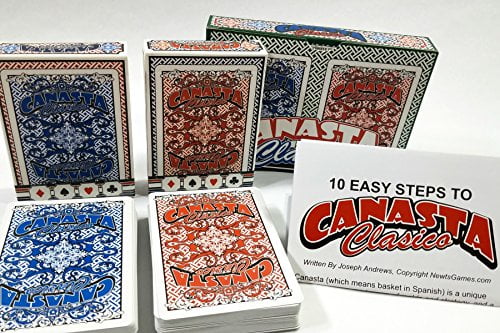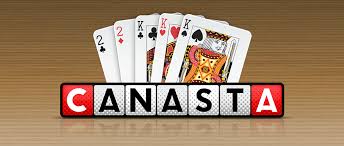
A mixed Canasta may not contain more than three wild cards.

Once melded, a wild card cannot be moved to a different set. For example, this means you may have only one wild card in a set of three cards. A wild card can take the place of a natural card in any set, but a set must always have more natural cards than wild cards. Wild cards: There are 12 wild cards-eight “little” and four “big.” The only difference between the little and big wild cards is their scoring value.Natural cards: There are 88 natural cards (eight of each rank: 4, 5, 6, 7, 8, 9, 10, Jack, Queen, King, Ace).The Caliente cards are added to the deck when playing the Caliente variation (described at the conclusion of the rules). Be sure to remove both Scoring cards and both Caliente cards. On a single winning hand, your team might score less than five hundred points, but your team could score in the thousands! Your team will score points for each card melded and may also be entitled to bonuses (or penalties!). You end the hand (go out) by playing your last card. To end your turn, you always discard one card to the Prize pile. Bonus cards and Stop cards have special purposes. Wild cards can be substituted for cards you need in a meld and they can also be used to freeze the Prize pile (very important!). This is important because you’ll need at least one set of seven or more cards (called a Canasta) in order to go out. Sequences, like 5-6-7, are NOT permitted in Canasta. Sets are three or more cards of the same rank, such as four Kings, six Fives or three Sevens.

You place, face up on the table (meld from your hand), sets of cards to score points. On each turn, you first draw a new card or-if you can-take the entire Prize pile (the discards). You are dealt a hand of 11 cards before each round of play. 5,000 points wins and it usually takes a few hands to do so. Score points by laying down and adding to sets of cards of equal rank.

You’ll find these variations following the main rules. The rules are only slightly different when 2, 3, 5 or 6 play. This Edition features custom cards that not only celebrate the basket imagery of the original game, they also make the game easier to learn and more fun to play!įour players are teamed in partnerships. “Canasta” means basket in Spanish and the game was named for the little wicker basket that the first players used to hold their cards. In 1950, after sweeping north from South America, Canasta became the biggest card game craze ever.


 0 kommentar(er)
0 kommentar(er)
